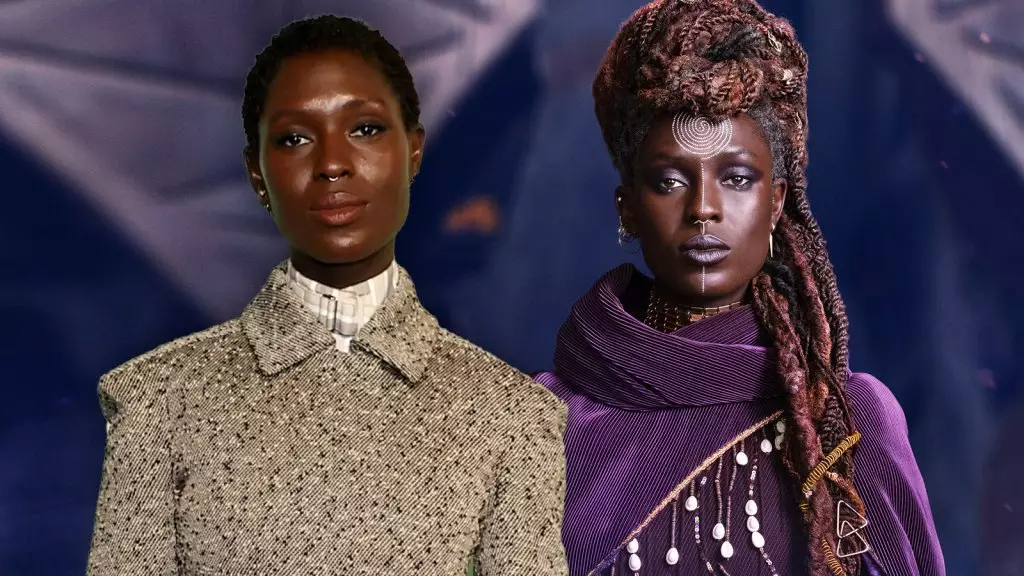In an era where social media amplifies voices yet often acts as a megaphone for hostility, the entertainment industry faces growing scrutiny over how it handles issues related to bullying and racism. Jodie Turner-Smith recently voiced her concerns about Disney’s response—or lack thereof—regarding the cyberbullying that her co-star Amandla Stenberg experienced in connection with their work on the Disney+ series, *Star Wars: The Acolyte*. Turner-Smith’s comments serve as a reminder that companies need to do more than merely profit from diversity; they must actively protect and support their artists against baseless attacks.
During a conversation with *Glamour UK*, Turner-Smith expressed her disappointment regarding the silence from Disney in light of Stenberg’s hardships. She articulated a strong belief that corporate entities bear a significant responsibility when their employees endure discrimination and harassment online. This sentiment sheds light on a crucial issue: companies are often too timid to confront toxic fan culture, especially when it comes to race.
Turner-Smith’s critique extends beyond mere commentary; it highlights a broader problem in the industry. The lack of public statements condemning cyberbullying signals to fans that harassment, particularly when rooted in racism, is not taken seriously. “They’ve got to stop doing this thing where they don’t say anything when people are getting f***ing dog-piled on the internet with racism and bullsh**,” she remarked. Here, Turner-Smith not only condemns the inaction but calls for a significant cultural shift within corporate entities.
A robust and transparent stance against racism can yield a productive dialogue between fans and the companies that seek to profit from them. The notion that taking a stand may alienate potential audiences is increasingly outdated. Turner-Smith argues that the purchasing power of communities of color is substantial and should not be disregarded. Yet, despite this knowledge, companies often adopt a defensive posture, fearing backlash from segments of their fan base that resist diversity.
In the aftermath of relentless online vitriol, Amandla Stenberg herself addressed the challenges of navigating through racism and hate. Describing the insults she faced as “hyper-conservative bigotry,” Stenberg gave voice to the emotional toll such attacks often take. While she anticipated a backlash, the impact was not fully graspable until it occurred. This illustrates the very real psychological burden that many artists of color are forced to bear in addition to their professional responsibilities.
Moreover, Stenberg’s decision to release a song addressing the “intolerable racism” she faced demonstrates the complexity of coping mechanisms in the creative industry. Art becomes a means of expression and healing, allowing her to channel her experience into something that positions her not merely as a victim but as a resilient figure declaring her truth. Stenberg’s poignant observation that the term “WOKE” has been distorted serves as a clarion call for the community to reclaim its narrative and speak out against injustice.
The conversation initiated by Turner-Smith and echoed by Stenberg underscores a pivotal moment in the entertainment industry. As audiences continue to embrace representations of diversity, the stakeholders within these corporations should be more proactive in establishing environments that are not only inclusive but also secure for their artists.
An essential aspect of this responsibility is public advocacy. Companies like Disney must formulate clear and decisive statements regarding unacceptable behavior from fans and create policies that support their talent amid adversity. Investors and audiences alike should be attuned to how a company treats its artists, as this can become a deciding factor in whom they choose to support.
The struggles faced by Amandla Stenberg highlight the need for corporate accountability in the age of social media. Jodie Turner-Smith’s powerful defense serves as both a critique of the systemic issues in the industry and a call to action that resonates far beyond the *Star Wars* franchise. As conversations around racism and inclusivity unfold, the onus remains on corporations to step up, ensure their artists feel supported, and cultivate a fan environment marked by respect rather than hostility.

